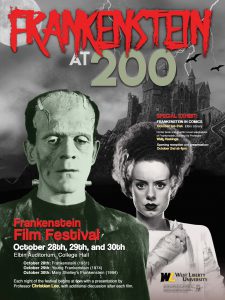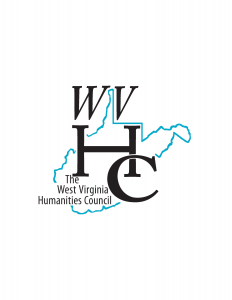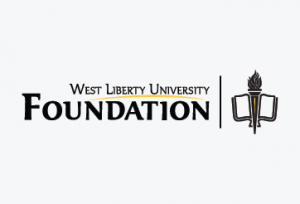CELEBRATING the BICENTENNTIAL of the FIRST PUBLICATION OF MARY SHELLEY’S FRANKENSTEIN (1818)
 The 200th anniversary of Mary Shelley’s Frankenstein, published in January 1818, was celebrated throughout the year on the campus of West Liberty University. During the Spring 2018 semester, the College of Liberal and Creative Arts hosted an interdisciplinary symposium, which illustrated the novel’s continued relevance and importance to scholarly work. the symposium featured three speakers: Dr. Matthew Zdilla, Associate Professor of Biology, whose presentation was titled “The Modern Modern Prometheus: Bringing the Dead Back to Life 200 Years after Frankenstein”; Dr. Aaron Harper, Associate Professor of Philosophy, whose presentation was titled “Alienation and Self-Alienation in Frankenstein”; and Dr. Angela Rehbein, Assistant Professor of English, whose presentation was titled “‘A Thinking and Reasoning Animal’: Gender, Agency, and Literary Authority in Frankenstein.”
The 200th anniversary of Mary Shelley’s Frankenstein, published in January 1818, was celebrated throughout the year on the campus of West Liberty University. During the Spring 2018 semester, the College of Liberal and Creative Arts hosted an interdisciplinary symposium, which illustrated the novel’s continued relevance and importance to scholarly work. the symposium featured three speakers: Dr. Matthew Zdilla, Associate Professor of Biology, whose presentation was titled “The Modern Modern Prometheus: Bringing the Dead Back to Life 200 Years after Frankenstein”; Dr. Aaron Harper, Associate Professor of Philosophy, whose presentation was titled “Alienation and Self-Alienation in Frankenstein”; and Dr. Angela Rehbein, Assistant Professor of English, whose presentation was titled “‘A Thinking and Reasoning Animal’: Gender, Agency, and Literary Authority in Frankenstein.”
The celebration picked up with following semester with a presentation by Dr. Wally Hastings, Professor of English. Dr. Hastings talked about the various comic book and graphic novel adaptations Frankenstein at the opening reception of a special exhibit of some of these books at the Paul N. Elbin Library.
Frankenstein Celebration at WLU
WLU will be celebrating 200 years of Frankenstein with a month long exhibit and events!
Posted by West Liberty University Admissions on Wednesday, October 3, 2018
Organizers of the event also hosted a film festival October 28-30th, featuring three classic adaptations of Frankenstein, including Boris Karloff’s 1931 version, Mel Brook’s Young Frankenstein, and Kenneth Branagh’s 1994 adaptation. Before each viewing, Communications professor Chris Lee discussed the historical and cultural contexts of the films being shown.
In addition to the on-campus event, the festival included book discussions at area libraries, including the Brooke County Public Library and as part of the Lunch with Books program at the Ohio County Public Library.
These events would not have been possible without the generous support of the West Virginia Humanities Council and the West Liberty Foundation.
Note: This project was presented with financial assistance from the West Virginia Humanities Council, a state affiliate of the National Endowment for the Humanities. Any views, findings, conclusions or recommendations do not necessarily represent those of the West Virginia Humanities Council or the National Endowment for the Humanities.

